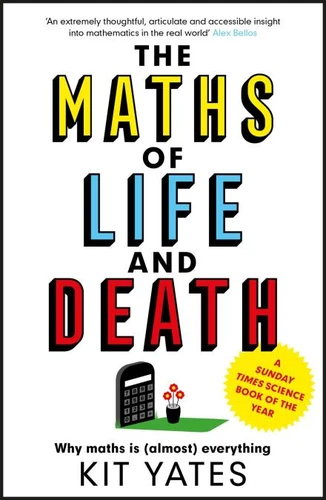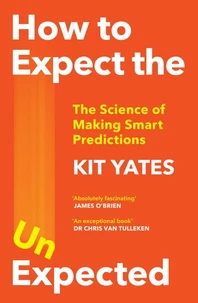The Maths of Life and Death
Par :Formats :
Disponible dans votre compte client Decitre ou Furet du Nord dès validation de votre commande. Le format ePub protégé est :
- Compatible avec une lecture sur My Vivlio (smartphone, tablette, ordinateur)
- Compatible avec une lecture sur liseuses Vivlio
- Pour les liseuses autres que Vivlio, vous devez utiliser le logiciel Adobe Digital Edition. Non compatible avec la lecture sur les liseuses Kindle, Remarkable et Sony
- Non compatible avec un achat hors France métropolitaine
 , qui est-ce ?
, qui est-ce ?Notre partenaire de plateforme de lecture numérique où vous retrouverez l'ensemble de vos ebooks gratuitement
Pour en savoir plus sur nos ebooks, consultez notre aide en ligne ici
- Nombre de pages352
- FormatePub
- ISBN978-1-78747-539-7
- EAN9781787475397
- Date de parution04/09/2019
- Protection num.Adobe DRM
- Infos supplémentairesepub
- ÉditeurQuercus
Résumé
*SELECTED AS ONE OF THE SUNDAY TIMES SCIENCE BOOKS OF THE YEAR* "This is an exquisitely interesting book. It's a deeply serious one too and, for those like me who have little maths, it's delightfully readable" - IAN MCEWAN"An exciting new voice in the world of science communication" - MARCUS DU SAUTOY"An extremely thoughtful, articulate and accessible insight into mathematics in the real world" - ALEX BELLOS"Kit Yates is a brilliant explainer and storyteller" - STEVEN STROGATZ__________Maths is the story of the world around us, and the wisdom it gives us can be the difference between success and disaster.
We are all doing maths all the time, from the way we communicate with each other to the way we travel, from how we work to how we relax. Many of us are aware of this. But few of us really appreciate the full power of maths - the extent to which its influence is not only in every office and every home, but also in every courtroom and hospital ward. In this eye-opening and extraordinary book, Yates explores the true stories of life-changing events in which the application - or misapplication - of mathematics has played a critical role: patients crippled by faulty genes and entrepreneurs bankrupted by faulty algorithms; innocent victims of miscarriages of justice and the unwitting victims of software glitches.
We follow stories of investors who have lost fortunes and parents who have lost children, all because of mathematical misunderstandings. Along the way, Yates arms us with simple mathematical rules and tools that can help us make better decisions in our increasingly quantitative society. You will discover why it's always sensible to question a statistic, often vital to ask for a second opinion and sometimes surprisingly handy to stick to the 37% rule...
We are all doing maths all the time, from the way we communicate with each other to the way we travel, from how we work to how we relax. Many of us are aware of this. But few of us really appreciate the full power of maths - the extent to which its influence is not only in every office and every home, but also in every courtroom and hospital ward. In this eye-opening and extraordinary book, Yates explores the true stories of life-changing events in which the application - or misapplication - of mathematics has played a critical role: patients crippled by faulty genes and entrepreneurs bankrupted by faulty algorithms; innocent victims of miscarriages of justice and the unwitting victims of software glitches.
We follow stories of investors who have lost fortunes and parents who have lost children, all because of mathematical misunderstandings. Along the way, Yates arms us with simple mathematical rules and tools that can help us make better decisions in our increasingly quantitative society. You will discover why it's always sensible to question a statistic, often vital to ask for a second opinion and sometimes surprisingly handy to stick to the 37% rule...
*SELECTED AS ONE OF THE SUNDAY TIMES SCIENCE BOOKS OF THE YEAR* "This is an exquisitely interesting book. It's a deeply serious one too and, for those like me who have little maths, it's delightfully readable" - IAN MCEWAN"An exciting new voice in the world of science communication" - MARCUS DU SAUTOY"An extremely thoughtful, articulate and accessible insight into mathematics in the real world" - ALEX BELLOS"Kit Yates is a brilliant explainer and storyteller" - STEVEN STROGATZ__________Maths is the story of the world around us, and the wisdom it gives us can be the difference between success and disaster.
We are all doing maths all the time, from the way we communicate with each other to the way we travel, from how we work to how we relax. Many of us are aware of this. But few of us really appreciate the full power of maths - the extent to which its influence is not only in every office and every home, but also in every courtroom and hospital ward. In this eye-opening and extraordinary book, Yates explores the true stories of life-changing events in which the application - or misapplication - of mathematics has played a critical role: patients crippled by faulty genes and entrepreneurs bankrupted by faulty algorithms; innocent victims of miscarriages of justice and the unwitting victims of software glitches.
We follow stories of investors who have lost fortunes and parents who have lost children, all because of mathematical misunderstandings. Along the way, Yates arms us with simple mathematical rules and tools that can help us make better decisions in our increasingly quantitative society. You will discover why it's always sensible to question a statistic, often vital to ask for a second opinion and sometimes surprisingly handy to stick to the 37% rule...
We are all doing maths all the time, from the way we communicate with each other to the way we travel, from how we work to how we relax. Many of us are aware of this. But few of us really appreciate the full power of maths - the extent to which its influence is not only in every office and every home, but also in every courtroom and hospital ward. In this eye-opening and extraordinary book, Yates explores the true stories of life-changing events in which the application - or misapplication - of mathematics has played a critical role: patients crippled by faulty genes and entrepreneurs bankrupted by faulty algorithms; innocent victims of miscarriages of justice and the unwitting victims of software glitches.
We follow stories of investors who have lost fortunes and parents who have lost children, all because of mathematical misunderstandings. Along the way, Yates arms us with simple mathematical rules and tools that can help us make better decisions in our increasingly quantitative society. You will discover why it's always sensible to question a statistic, often vital to ask for a second opinion and sometimes surprisingly handy to stick to the 37% rule...




